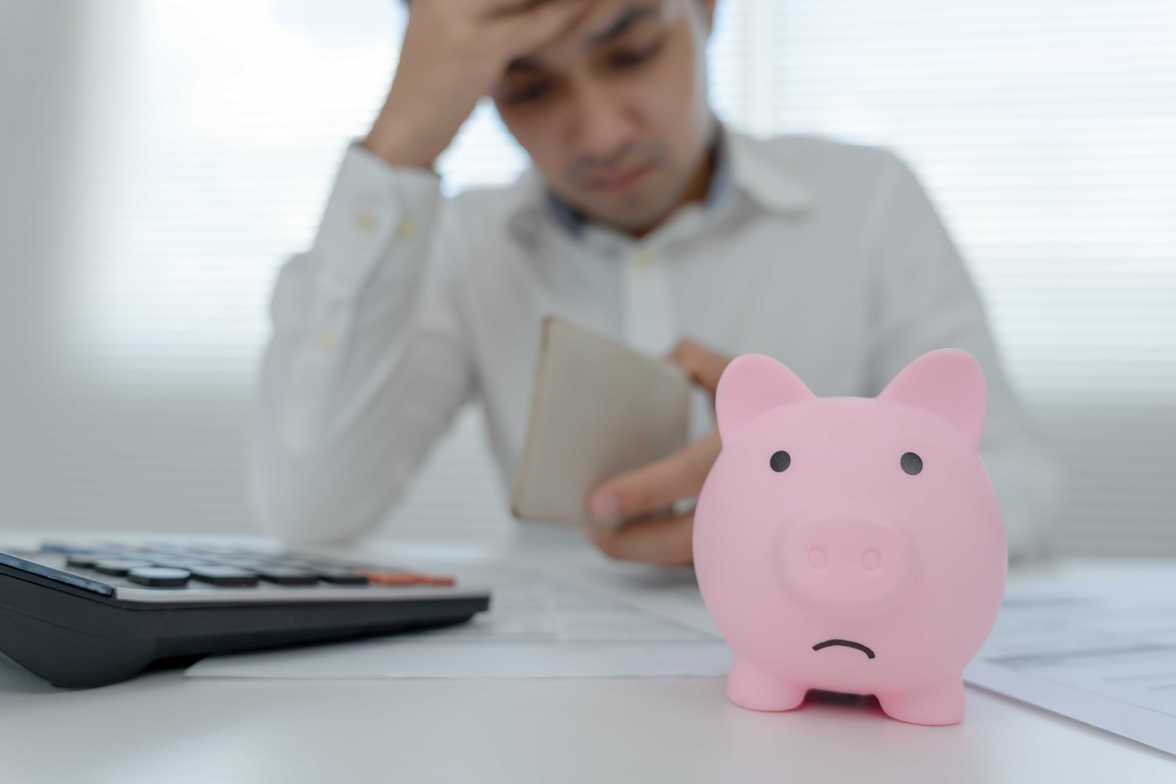
Are you feeling like a failure because you’re in debt or don’t have enough money? Do you feel inferior to people who have more prestigious occupations? Do you feel bad about yourself because you don’t have nice things? Do you feel more confident when you have money? Do you buy expensive things even though you can’t afford them? If you answered “yes” to any of these questions, you may have low self-esteem.
What Is Self-esteem?
Self-esteem or self-worth refers to how we value ourselves. Identity, the feeling of competence, the feeling of security, self-confidence, and a sense of belonging define self-esteem.[1] Healthy self-esteem is the ability to recognise your strengths, acknowledge your weaknesses, and believe you’re a worthy person despite your shortcomings or circumstances.[2] Low self-esteem is feeling awkward, incompetent, less than, or unlovable. People with low self-esteem are typically hypersensitive as well as hyper-alert to signs of inadequacy, rebuff, and rejection.[3] The devaluing of self can contribute to poor mental health and impact quality of life.
Low Self-esteem and Mental Health
Low self-esteem isn’t classified as a mental health condition but the two are closely connected. If many things chip away at your self-esteem for a long time, then you could develop mental health problems including anxiety or depression. On the other hand, aspects of low self-esteem such as anxiety about an inability to do certain things, blaming yourself unfairly, feeling hopeless, self-hatred, or a sense of worthlessness could be signs of a mental health condition.[4] It’s hard to know which issue comes first, but low self-esteem and mental health problems generally go hand in hand.[5]
The Impact of Low Self-esteem on Quality of Life
In addition to contributing to mental health issues, low self-esteem causes other problems that reduce quality of life including the following:[6]
· Relentless self-criticism that can lead to anger, anxiety, depression, guilt, and shame
· Relationship problems such as tolerating mistreatment or abusing others, which can create health or legal issues
· Avoiding interacting with others or participating in activities for fear of being judged, which could lead to social isolation
· Fear of trying because of doubting one’s abilities or devaluing self, which can lead to underachieving (e.g., not going to university or lack of career advancement)
· Over-achievement or perfectionism in an attempt to compensate for a sense of inferiority, which could cause relationship and health problems
· Lack of self-care including abusing or neglecting oneself (e.g., drinking too much, overeating, self-harm, and substance abuse), which jeopardises well-being
How Money Affects Self-esteem
Social conditioning causes people to equate money and material things with self-worth. A lack of wealth, possessions, and privileges and working in what are considered menial jobs cause people to believe they’re worthless, unimportant, and even unlovable.[7] Poor treatment from others because of low socioeconomic status reinforces this negative view of self.
Dangers of Tying Self-esteem to Money
Self-worth based on external things like money is shallow and fragile. When people allow money and all its trappings to define who they are and determine their value as human beings, their self-esteem rises and falls based on how much money they have. A job loss, having to use savings, accumulating debt, or bankruptcy could cause their self-esteem to suffer.[8] Plus, working too much to make huge amounts of money can hurt their relationships, cause them to miss important life events, and harm their physical and mental health.[9] Even if people with low self-esteem make a lot of money, they may never have enough to feel good about themselves deep down because healthy self-esteem isn’t based on one thing like money.[10] It consists of our views about the things that define us including our accomplishments, activities, backgrounds, capabilities, experiences, gifts, personalities, physical bodies, and relationships as well as our perceptions about how other people see us.[11]
Ways to Improve Your Self-esteem
Improving your self-esteem will help you feel stronger, more stable, and better capable of dealing with your problems. Viewing money as a tool, taking care of yourself, focusing on the good things, doing something challenging, and being kind to yourself are five things you can do to strengthen your self-esteem.
1. View Money as a Tool
Money is a tool for creating and maintaining a good quality of life. We buy products and services with it, save it for a rainy day, donate it to help others, and use it to achieve our goals. Defining your self-esteem by who you are (e.g., your behaviour, beliefs, character, interests, talents, and values) will increase and safeguard it against changes in your finances.[12]
2. Take Care of Yourself
Taking care of yourself is a large part of valuing yourself. Eating a healthy diet, getting enough sleep, exercising regularly, connecting with family and friends, and engaging in relaxing activities will improve both your self-esteem and overall health.
3. Focus on the Good Things
People can have such high standards or feel bad about themselves for so long that they don’t notice the good things in their lives. Completing tasks, having a good meal, getting out into nature, engaging in hobbies, and taking care of yourself are just some of the good things in life. Noticing the good things in your life, no matter how small, can help you feel better about yourself despite your money problems.
4. Do Something Challenging
Challenging yourself can help you strengthen your self-confidence and increase your knowledge and skills. Pursuing interests, helping others, taking a class, trying a new recipe, learning a new language, or doing something that you’ve always wanted to do are just some of the ways you can challenge yourself.
5. Be Kind to Yourself
Treating yourself with kindness and respect will help you view yourself as worthwhile. [13] If you have been down on yourself for a long time, it may be hard to be kind to yourself. Try to be patient with yourself when you’re having a hard time being nice to yourself. In time, you’ll begin to see the results of self-kindness: decreases in anger, guilt, and shame and increases in joy, inner peace, and self-worth. These tips can help you treat yourself with kindness:
a. Learn more about yourself.
Getting to know yourself will help you define yourself, understand your emotions, make sound decisions, and better empathise with others.[14]
b. Allow yourself to have feelings.
Acknowledging and accepting your feelings even if they’re uncomfortable will help you better understand your needs, make more rational choices, ease anxiety, and improve functioning.[15]
c. Minimize the unkind thoughts you have about yourself.
Thinking negatively about yourself fuels pessimism and self-doubt and contributes to anxiety, chronic worry, depression, and obsessive-compulsive disorder.[16] Ways to decrease negative self-talk include engaging in positive distractions, keeping a journal, practising mindfulness, preventing rumination, repeating positive affirmations, and showing yourself compassion.[17]
d. Avoid comparing yourself to other people.
Comparing ourselves to others is normal and sometimes beneficial such as when it inspires us to achieve our goals.[18] But it can also cause us to feel bad about ourselves and devalue our lives. These tips can help you stop comparing yourself to others:[19]
· Avoid situations that cause you to make comparisons (when possible).
· Try to remember that other people have problems and shortcomings no matter how good things might be for them.[20]
· Appreciate the good things in your life.
When to Seek Help
Having problems in your relationships, at school and/or work, interacting with others, or with daily functioning are signs that you may need to seek help from a therapist or counsellor. [21]
Your Relationships
· You don't feel like you're worthy of being loved and respected.
· You feel angry, ignored, overwhelmed, or taken advantage of in your relationships.
· You blame yourself when someone mistreats you. School and/or Work
· You assume that you will fail in school, at work, or both.
· You sabotage yourself to ensure that you will fail.
Interacting with Others
· The thought of connecting with others causes you severe social anxiety because you believe you don’t measure up.
· You believe your needs are unimportant so you allow others to cross your boundaries and take advantage of you.
Daily Functioning
· You have trouble with starting, completing, and/or finishing tasks.
· You feel alone and don’t know how to help yourself.
· You have mood swings.
· You try to say or do the right thing in hopes that people will agree with you or like you.
How Therapy Can Help
Therapy or counselling can help you improve your self-esteem in the following ways:
· Determine and understand the sources of your low self-esteem such as an abusive childhood, traumatic events, and unhealthy relationships
· Explore and make sense of negative and traumatising experiences in a safe and supportive place
· Recognise the critical voices of parents, partners, peers, and others that cause you to feel bad about yourself and contribute to negative self-talk and replace them with your self-compassionate voice
· Notice when you’re experiencing catastrophic thinking and learn how to stop it from disrupting your daily functioning and hindering your ability to achieve goals
You Can Strengthen Your Self-esteem and Improve Your Life
If you’re feeling bad about yourself, it may be hard to imagine becoming a confident person who feels worthy, lovable, and entitled to a good life. But, no matter your net worth, background, and circumstances and the messages you receive from society, you are a valuable person. Working with a therapist or counsellor can help you strengthen your self-esteem and find positive ways of managing the issues and situations that diminish it.[22] At Life Counsel, we provide a safe and welcoming place for you to talk about what you’re going through and find solutions to your problems.
[1] Kendra Cherry, “What Is Self-Esteem?” accessed July 23, 2021, Very Well Mind, https://www.verywellmind.com/what-is-self-esteem-2795868#what-is-self-esteem.
[2] “Identity & Self Esteem,” Bridge the Gapp, accessed July 23, 2021, https://nl.bridgethegapp.ca/adult/knowledge-centre/identity-self-esteem/.
[3] Lena Firestone, “Low Self-Esteem: What Does it Mean to Lack Self-Esteem?” Psych Alive, accessed July 25, 2021, https://www.psychalive.org/low-self-esteem/.
[4] “Self-esteem,” Mind, accessed July 23, 2021, https://www.mind.org.uk/information-support/types-of-mental-health-problems/self-esteem/about-self-esteem/.
[5] Anne Gold, “Why Self-Esteem Is Important for Mental Health,” National Alliance on Mental Illness, accessed July 25, 2021, https://www.nami.org/Blogs/NAMI-Blog/July-2016/Why-Self-Esteem-Is-Important-for-Mental-Health.
[6] “Self-esteem: Low Self-esteem and Quality of Life,” Better Health, accessed Jul 25, 2021, https://www.betterhealth.vic.gov.au/health/healthyliving/self-esteem#low-self-esteem-and-quality-of-life.
[7] “Social Status,” Wikipedia, accessed July 25, 2021, https://en.wikipedia.org/wiki/Social_status#Determination.
[8] Soapbox, “Your Relationship with Self-worth and Money: It’s Complicated,” Financial Best Life, accessed July 25, 2021, https://financialbestlife.com/your-relationship-with-self-worth-and-money-its-complicated/.
[9] David Geller, “Is Your Self-Worth Tied to Your Net Worth?” Wealth Enhancement Group, accessed July 25, 2021, https://www.wealthenhancement.com/blog/self-worth-tied-to-net-worth.
[10] Kristin Wong, “Your Salary Does Not Define You: How to Separate Your Net Worth From Your Self-Worth,” Well+Good LLC, accessed July 25, 2021, https://www.wellandgood.com/rheumatoid-arthritis-budget/.
[11] Sarah Vanbuskirk, “Why It's Important to Have High Self-Esteem,” Very Well Mind, accessed July 25, 2021, https://www.verywellmind.com/why-it-s-important-to-have-high-self-esteem-5094127.
[12] Soapbox, “Your Relationship with Self-worth and Money.”
[13] “Self-esteem: How Can I Improve My Self-esteem?” Mind, accessed July 25, 2021, https://www.mind.org.uk/information-support/types-of-mental-health-problems/self-esteem/tips-to-improve-your-self-esteem/.
[14] Niia Nikolova, “Want to Be Happier? Try Getting to Know Yourself,” The Conversation, accessed July 26, 2021, https://theconversation.com/want-to-be-happier-try-getting-to-know-yourself-109451.
[15] UC Team, “Allow Yourself to Feel the Feelings. All of Them.” Unlikely Collaborators, accessed July 26, 2021, https://www.unlikelycollaborators.com/allow-yourself-to-feel-the-feelings-all-of-them-/.
[16] “How to Turn Your Negative Thinking Around,” Cleveland Clinic, accessed July 26, 2021, https://health.clevelandclinic.org/turn-around-negative-thinking/.
[17] Kia, “How to Stop Negative Thoughts – Depression and Negative Thinking,” Beyond the Blues, accessed July 26, 2021, https://beyondtheblues.co.uk/2020/05/15/how-to-stop-negative-thoughts/.
[18] “How to Train Your Brain to Not Compare Yourself with Others,” BBC, accessed July 26, 2021, https://www.bbc.co.uk/bitesize/articles/zds84xs.
[19] Susan Biall Haas, “How to Stop Comparing Yourself to Others: Break the Habit of Feeling Insecure, Envious, and Discontented with Your Life.” Psychology Today, accessed July 26, 2021, https://www.psychologytoday.com/us/blog/prescriptions-life/201803/how-stop-comparing-yourself-others.
[20] “Self-esteem: How Can I Improve.”
[21] Meredith Brown, “Therapy for Low Self-Esteem: How It Works, When to Seek It & Treatment Options,” Zen Care, accessed July 26, 2021, https://blog.zencare.co/therapy-low-self-esteem/.
[22] “Self-esteem: How Can I Improve.”

Stathi Anthopoulos
Contact Me



